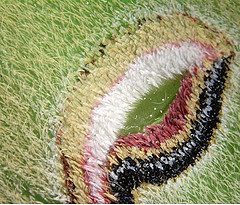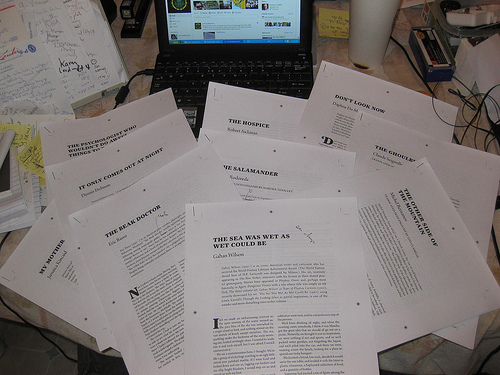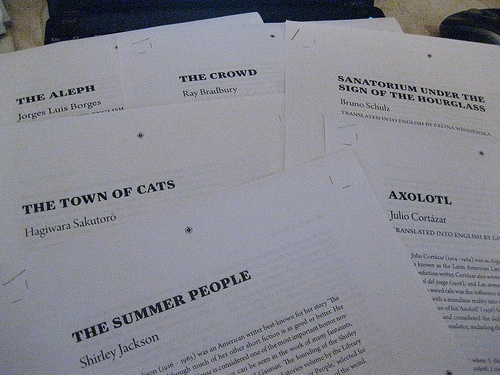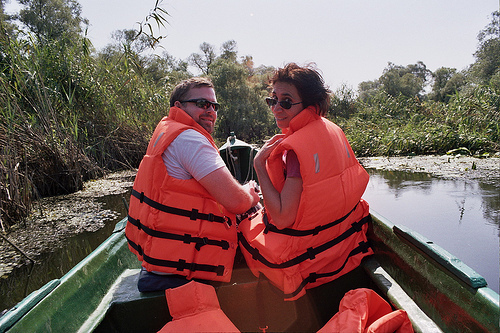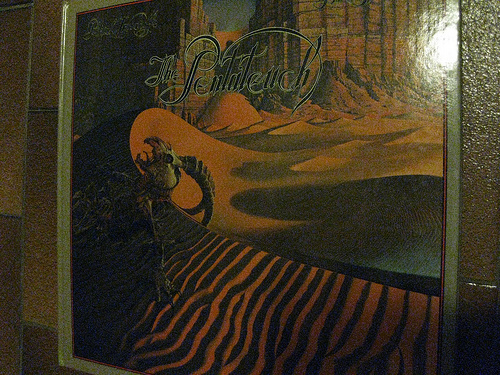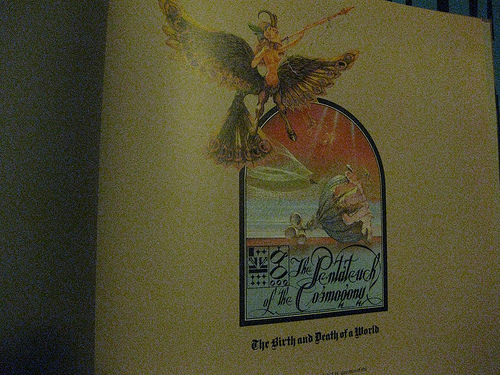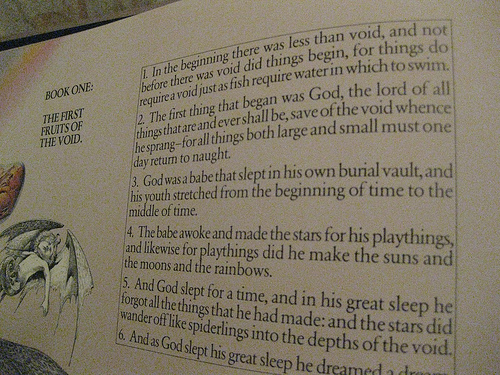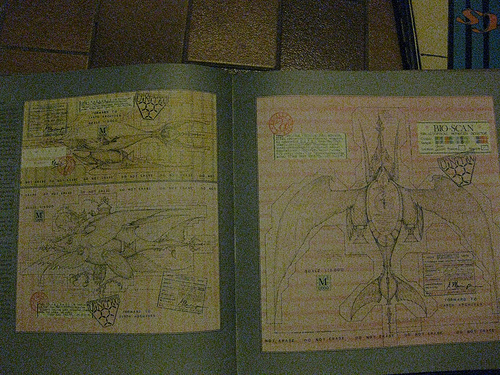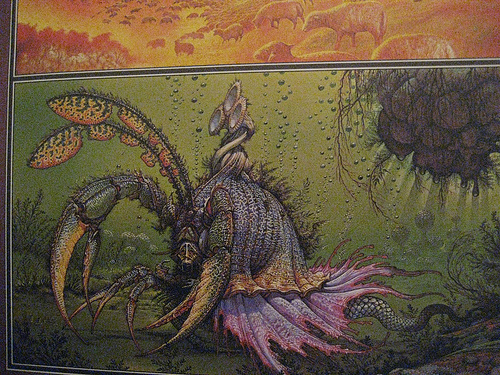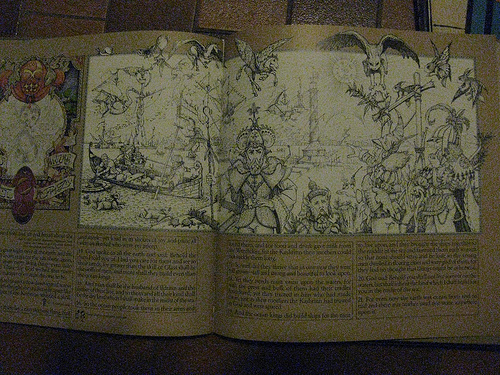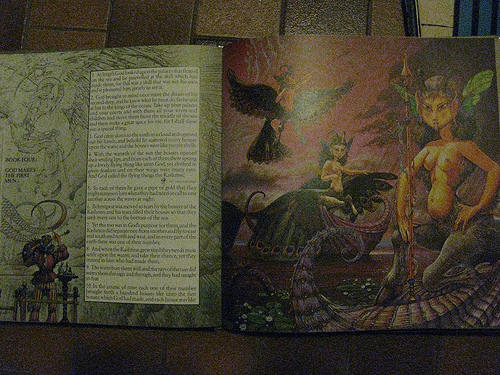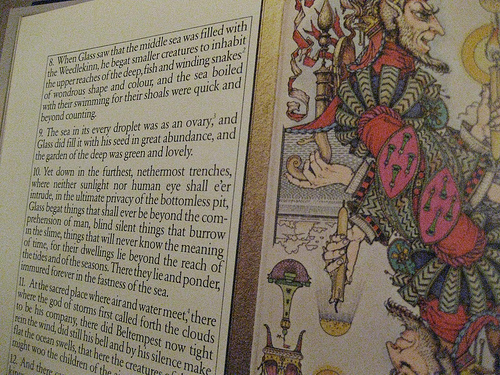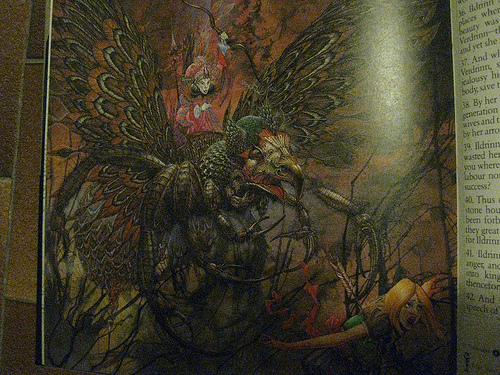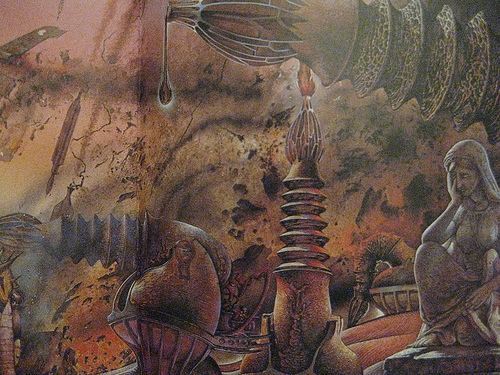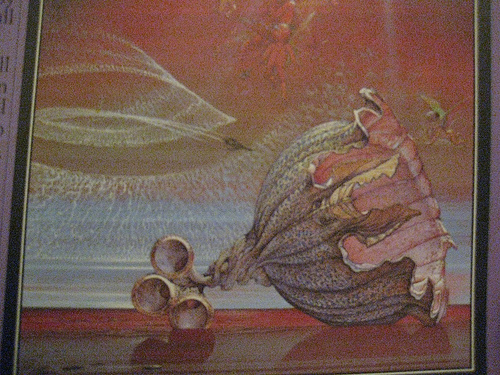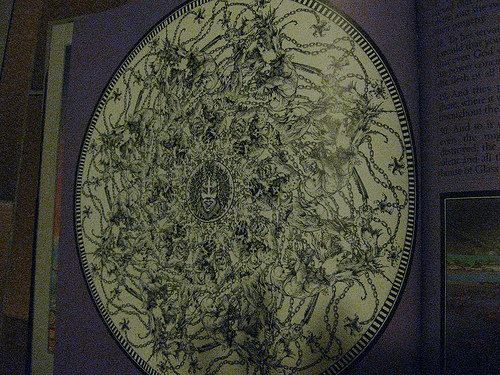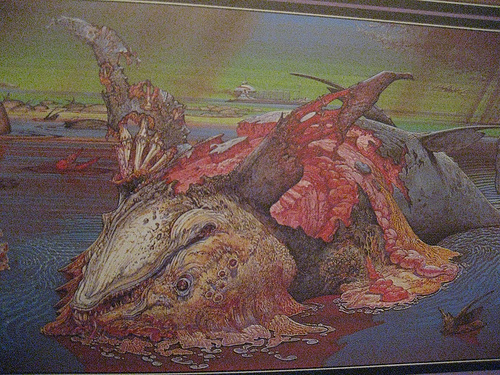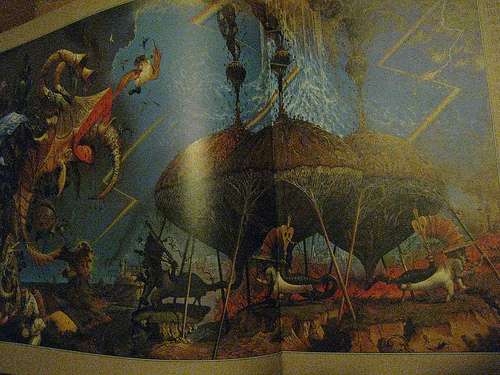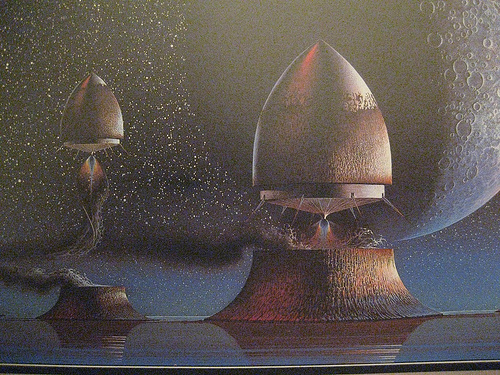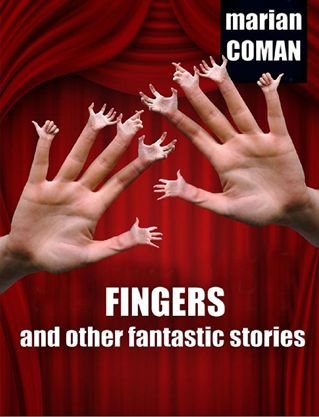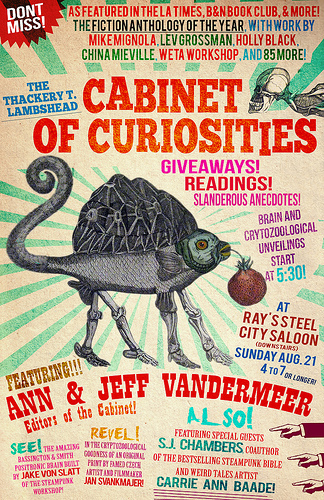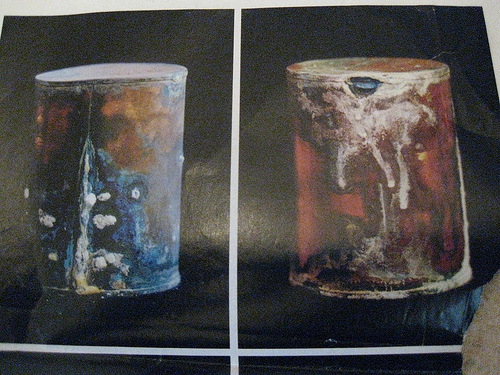Jeff VanderMeer's Blog, page 47
August 25, 2011
The Journals of Doctor Mormeck (Mountain)–Entry #20
Note: Been reading this serialized long story/novella? Please support a full-time writer. Paypal to vanderworld at hotmail.com—much appreciated! Donations above $21 will entitle you to a free copy of initial anthology or stand-alone book appearance.
Living on a far-distant planet, Doctor Mormeck works for strange beings that might or might not be angels by conducting surveillance across a hundred thousand alt-Earths. Complicating things are a transdimensional race of intelligent komodos wreaking chaos throughout the worlds. When an avatar of Mormeck is sent to a war-torn winter city to investigate a mysterious Presence, the doctor will become embroiled an ever-widening conflict.
Archive is here, Journals of Mormeck, and first entry is here.
I drank a book by a man named Radoslav A. Tsanoff while in the angels' library last time. It was called The Nature of Evil, and in it Tsanoff related the philosophy of a German named Julius Bahnsen, who believed that reality was an expression of a single, unchanging force that expressed energy, expressed movement, through unrelenting slaughter throughout the universe with no other purpose. I had this book much on my mind as I finally set out to talk to Marty at the Grim Lighthouse.
This Grim Lighthouse existed in a temporal and dimensional abnormality. It was unstable, and it drew other realities into it so that ghosts truly roamed its winding stairs, its rooms, the grounds around it. And due to the nature of the abnormality, this Grim Lighthouse drew to it like a beacon meant for the purpose every evil, wretched, terrible act. To approach it was to approach a montage of horrors. And yet, and yet, it represented my best chance to talk to Marty, in a manifestation that walked amongst horrible marvels each and every day. And yet it was in a way one of the last lighthouses in that world.
I could not send an avatar to that place without alerting Gabriel and the other angels because I would have had to engage the bear Seether. Instead, I slowly increased the number of luna moth spies around the Grim Lighthouse, using their own self-replicating ability. Then I had the luna moths settle en masse upon a skeleton lying on a bed of loam and moss near the edge of Marty's property and inhabit it. The skeleton had belonged to a man in that reality who had died of radiation sickness and of a worldwide pandemic. It was difficult to know which had taken his last breath from him, or even to recognize what scavengers had stripped the flesh from his bones. I knew only that his rictus, animated by my moths, would not be the strangest thing that this Marty had seen, that Mormeck Mountain in this form might make a better connection with her than a single moth.
And so I took up the skeleton through my moths, flooding the chest cavity, surrounding the legs, pouring into the skull, a single moth each inhabiting each eye socket. In a soft flurry of wings, against the perpetual yellow-orange-black light of late afternoon, I dressed the man's bones as if my moths were a shivery, shifting suit and this were some perverse version of a fancy date, like the ones I had spied upon across other realities. Slowly, the impossibly strong legs of my moths settled into his femurs, his other bones, and each moth delicately guided by my instructions, Mormeck Mothman rose from his bed of loam and walked, at first stiffly and then with more fluidity across that twisted landscape toward the lighthouse.
As I have said, the light on that alt-Earth was always the reflection of late afternoon, just before dusk, in that moment when it seems like a golden orange eye is squinting across the horizon. The sun here acted in preternatural ways—or, rather, the planet caused the sun to seem deranged, but this was just in the eye of the beholder. Terrible things had happened to this Earth. Half the oceans were filled with plastics and every pollutant imaginable had been loosed against nature. Wars for precious resources had left whole countries nothing but craters of death and suffering from nuclear bombs and warheads. Disease had spread, especially mutated viruses, and animal life had changed in drastic ways in a short amount of time. Perhaps two million people now populated a world that had once held eight billion. And into the burgeoning of this senseless slaughter and decay had crept the abnormalities that manifested for reasons mysterious even to the angels in various places around the globe…and particularly around the Grim Lighthouse…
There were bodies on the grounds approaching the lighthouse, but they did not exist always or even ever on this alt-Earth. As visceral as their wounds, as bright the red of their blood, as loud the sound of their moans, as abrupt and useless the violence they visited upon one another…they existed somewhere else, and it was only some hidden pull, like a celestial riptide, that drew them to manifest in this place, while beyond them the dark tower of the lighthouse rose shrouded in shadow, from the windows dotting the sides sudden flares of an almost infernal fire erupting only to subside. Every manner, too, of ghostly creature wraithed through the bushes and trees, dug with massive snouts and muzzles in the tangled dark remains of Marty's garden. Among huge misshapen vines that lay like odd disfigured arms these beasts some with three or four bloodshot eyes and fangs like tusks rooted out pale underground animals that looked disturbingly human and ripped out their throats and flung them and worried them and did much worse as they screamed. The forms that passed across the sky, that formed purple-black bruised shadows as they not so much flew as scuttled across the sky did not bear scrutiny.
Komodos did not visit this place—it did not fit their philosophy of a joyous chaos; they would have hated Bahnsen's view of life. Angels did not visit this place anymore, either. They had come, according to the records, only to observe the worst of the beginning of the end, silently and invisibly…from hilltops and from buildings, gathering like flocks of scavengers as the panic spread and slaughter by germ and by radiation and by panic and by every means possible, that the death throes of this world might be witnessed. They did nothing but watch.
…And through this now haunted tableau now strode Mormeck Mothman as if none of them had ever existed, even though he knew better. Because there was nothing I could do for them, nothing at all. I was there to talk to Marty—and I knew if I stopped, if I absorbed what I saw, I would be lost. Ground Zero for the temporal abnormality was the lighthouse itself. What awaited me inside would make all of this look like the most benign of carnival celebrations.
I found her at the door to the lighthouse, about to go inside. She felt my presence at her back and she turned to look at me. She did not seem surprised by what she saw, but why should she? I was the least of her worries by then. Marty the Lighthouse Keeper in this world was dying. I could see it in the wrinkles at the corners of her eyes, permanently tightened by the pain and stress. I could smell it on her breath through the luna moths' sensors. She was stooped over as if her mortality were a weight upon her back. And yet in her gaze I saw the same patience and the same compassion and a kind of resignation that wasn't defeat.
"You're here," she said, and for one strange, exhilarating moment I thought she knew who I was. "You're physically here. You're not a…ghost."
"No," I said. "I am not a ghost." Now that I was there, facing her, I found my words were failing me. I couldn't say what I wanted to say and feared anything I said would drive her away.
She looked away for a second, then back at me as if to see if I would vanish in between her glances.
"Who are you?" she asked. Her voice was raspier than on other alt-Earths. I didn't know if it was a symptom of her condition
.
"I am an alien life form from a planet very far away," I said. "I work for beings you might call angels."
A wry, bitter smile. "I'm hallucinating. I'm farther gone than I thought."
"You could humor a hallucination. I've just come to talk for awhile."
"Are you here to save me?"
"No."
"Good. I can't be saved. Let's be clear about that." She thought for a moment, then said, "Do you want to come up into the lighthouse?"
"Not yet."
"You know what's in there, then…but it's not real."
"It's real somewhere."
Her eyebrows rose. "I know where we can go."
***
On this Earth Marty had stumbled into being a lighthouse keeper. Here, she was not a spy transmitting information through her kisses. Here, she had become a marine biologist committed to saving species as the environment world-wide became more and more degraded. As that degradation had fed civil unrest and then anarchy, her government-funded position had dissolved and with the old lighthouse keeper dead she had taken over. But she was dying—of low-grade radiation sickness that had combined with pollutants on this alt-Earth and the toxins entering the world from the temporal dislocation. The confluence of these elements had caused inoperable cancers in her body, some of them wormholing into other dimensions. If the roving lawlessness or madness didn't claim her first, she had two or three years left—roughly the same time her water and food supplies in the lighthouse would run out. Because of the temporal instability, I couldn't save her, and in the bifurcating realities that would be created by trying, or going farther back along the timeline, she would still die of various causes within the next five years. Some versions of reality are only so amenable to treaties with "free will." And in any event, this world was dying. Across all timelines, within a decade, there would be no humans left alive on Earth. In fact, almost no mammals of any kind.
***
She took me to where she felt most at home. She took me down to the rocky shore beneath the lighthouse, in the strange clarity of the murk, a luminous twilight having settled over the world—and shooting through that twilight the pure, burning fire of the Grim Lighthouse's beacon, setting the edges of waves ablaze and giving strange glimpses of the ridge-stippled backs of "real" behemoths breaching and thrashing far out at sea. On the curling path edged with wind-stunted bushes, we passed through the ethereal carcasses of huge sea beasts with tentacles and fins and bloated bellies from which peeked other creatures that stared at us with large, glowing eyes and followed our progress with a kind of dual hunger and helplessness.
The sand made my progress difficult, but Marty was surprisingly nimble and light of foot, and her sandals in one hand, staring out over the water, seemed rejuvenated by the mere glimpse of the sea. She took me down to the tidal pools amongst the outcroppings of black rock, ignoring the shambling human wreckage that paced, that ran, back and forth across the beach, the unspeakable acts that were taking place in the interstices between spaces, between atoms. It was true that the screams and the sickening sounds of flesh giving way tended to fade over time, mere repetition being enough to put a distance between those acts and one's reaction to them. Still, for a moment it made me want to extinguish every alt-Earth just to forever escape from these cruelties.
She showed me what lived in the tidal pools now: radiation-eating jellyfish, carcinogen-devouring sea anemones. Translucent squid that pulsed green-and-blue internally with pieces of plastic, absorbed but, incredibly, being broken down in ways human scientists might have thought impossible. The sounds of the surf in the background were a hissing whisper, a reminder that some things still functioned on this Earth. The smell of toxins, of oil, was another kind of reminder.
The Moon had begun to rise in the sky. There was a large black spot on it where once had been an enormous lunar colony. They'd gotten cut off from Earth when the chaos started and toward the end, in one of those crippling examples of the irrational, fought amongst themselves, eventually causing a nuclear chain reaction that destroyed the entire colony.
"The world doesn't want us, hallucination," she said. "The world doesn't need us. The world is already working on repairing itself."
"My name is Mormeck," told her. "I'm not a hallucination."
"Mormeck the Hallucination," she mused in a weary voice. "At least you're more visually interesting than the rest."
"You don't believe me."
"Yes, I know. You're from a distant planet. You work for angels. You think these ghosts, these horrible manifestations, are real."
I would have to show her. A squadron of luna moths peeled away from the skeleton I had chosen and settled on her hands, pricked her fingers with their needles. She gasped, pulled away, but in addition to the tactile reassurance of my existence they had deposited a wealth of encoded information that was traveling through her bloodstream up into her brain, where I could see it begin to explode like fireworks. Her face lit up and her gaze became distant and her body convulsed, once, twice, and as the luna moths returned to me I went to her and I held her as best I could, crushing moth wings, so she wouldn't fall against the rocks and hurt herself. Her eyes were hazel. They were deep. I could feel myself falling…and then she returned to herself. Was herself. Again. Except with worlds and galaxies behind her stare. With the angels there, in all of their terrible ambiguity. And me, most of me. Not the part of me that had spied on the other Marty's. Not yet.
She sat up, a look of terrible concentration on her face. "You're real…I think you might be real."
"There are many, many alternate Earths, Marty. What you're experiencing here is the detritus and horror not just of your own world's dying, but the combined psychic-temporal terror and cruelty of all of the rest superimposed on this reality."
"But why?"
"Not even the angels know. There are rips and gaps and confusions between realities sometimes—and like will seek out like, given the right conditions. The universes were not created by someone who was always sane in the way you might recognize 'sane'." Did I believe even this stinking gobbet of rationalization? I wasn't sure.
A hint of pain mixed with interest clouded her features and she looked away, out over the sea and the reckless, constantly moving sweep of the Grim Lighthouse's light across the waves, the faintly flickering roar of men and women in deadly battle distant across the expanse of beach. "This is all real somewhere, like you said. So that means that this pathetic excuse for a planet that we've fucked up so royally isn't our only chance."
"There are millions of Earths, yes, and on some of those other threads, human beings make much better decisions." I didn't want to have to tell Marty that, sooner or later, on about eighty percent of alt-Earths, humans more or less committed species suicide. In those far-distant times ahead of us new forms of life would arise to replace them, but beyond a certain point even the angels couldn't see…or predict.
Marty let out a huge, shuddering sigh, and it took a moment for me to realize that it was a sigh of relief, and that the sudden brightness of her eyes meant she was quietly crying.
"Maybe I can save you," I said, unable to stop myself from saying it. I hadn't come here to save her. I couldn't save her. But I said it.
The tears turned to a flash of anger. "For what? Why? Can you bring back everyone I love who has died? Any of them? I told you, this world doesn't need us. It's better off without us." Turning on me then with a kind of rage: "Here at least I will break down into my cells, my atoms, and return to the Earth. At least I'll be useful for something, Hallucination." Hallucination. So we were back to that. Perhaps I deserved it.
I began to reply and she cut me off. "Why are you showing me this? Why? And why are you here?"
Any organism can die, even a mountain. For a person it might be a spore in the eye that burrows into the brain, or a paper cut that creates an opening for more serious infection. For a mountain it might be love unreturned. Love that the recipient, even the recipient's doppelganger, perceives as repugnant or wrong.
But I knew why I had come to the Grim Lighthouse.
So I told her.
The Journals of Doctor Mormeck (Mountain)–Entry #20 originally appeared on Ecstatic Days on August 25, 2011.




The Journals of Doctor Mormeck's Avatar–Entry #13
Note: Been reading this serialized long story/novella? Please support a full-time writer. Paypal to vanderworld at hotmail.com—much appreciated! Donations above $21 will entitle you to a free copy of initial anthology or stand-alone book appearance.
Living on a far-distant planet, Doctor Mormeck works for strange beings that might or might not be angels by conducting surveillance across a hundred thousand alt-Earths. Complicating things are a transdimensional race of intelligent komodos wreaking chaos throughout the worlds. When an avatar of Mormeck is sent to a war-torn winter city to investigate a mysterious Presence, the doctor will become embroiled an ever-widening conflict.
Archive is here, Journals of Mormeck, and first entry is here.
What are you? I had asked.
Wouldn't you like to know? It had replied, with a laugh like a rusty gate.
I had recovered my senses enough to recognize that I had a passenger: something embedded in Smudge-me as I had myself been embedded in the wall of the explosion crater. It was a remnant, a trace, really, of a Remnant. A fleck of nano-metal that could only have been seen under a microscope. But I sensed it now. It had shifted within my body to a position right below the bellybutton that the tendril fed. I had enough of my senses back to analyze it, and then to recognize it. My first instinct was to eject it from my body, but I had been alone a very long time, with only my slow and incomprehensible thoughts…and sometimes, nightmares.
I sent an emissary to the Shrapnel Fleck, as I called it. The emissary, the avatar of my avatar, told Fleck that it would be flushed from my body if it did not respond to interrogation. After a long silence, and then with a sound a bit like a rusty door, Fleck responded that it understood, and eventually discarded its belligerence. It had to get along with me or die.
Are you aware? [my emissary asked]
Every nano-particle in a Remnant's body is encoded with its consciousness.
Are you self-replicating?No.
Do you have the capability for self-destruction?
I would have done so already if I had that capability.
That doesn't answer my question.
No, I do not.
Do not what?
Have the capability to self-destruct.
Now put it all together in one sentence.
I do not have the capability to self-destruct.
Who were you originally, back on your home planet?
I was a female scientist, a biologist entrusted with doing intel on the angels after our initial encounter with them.
Are you aware of any other survivors from your enclave in this reality?
I would sense them if there were.
That doesn't answer the question.
There are no other survivors.
Are there other enclaves of the Remnant on this alt-Earth?
No.
Do you have any method of reaching the Remnant on other Earths?
No.
Do you know of any portals of any kind with the capacity for transport away from this alt-Earth? They must not be angel-maintained.
Yes.
Where?
When.
What?
When.
When what?
The next non-Remnant portal according to our calculations opens in approximately 100 years. It is a rogue Seether portal and you will need to negotiate with it to obtain self-passage. [It transmitted coordinates to my emissary that corresponded to a location in the Far East, in a valley below Siberia, several miles above the border with China.]
You will remain inside of my body as my advisor. I will call you Fleck. In return, I will help you rebuild. Is this acceptable?
Yes.
Fleck, like me, had been badly traumatized by the explosion, and so I left her alone for awhile. I also had to process the information that I was going to have to survive a century just to get back to Mormeck Mountain.
It was time to go visit my friend Pavlov.
The Journals of Doctor Mormeck's Avatar–Entry #13 originally appeared on Ecstatic Days on August 25, 2011.




August 24, 2011
Weird in a Cave, Weird in a Phone Booth, Weird in a Tunnel, Weird in a Maze
Living with the proof pages of our THE WEIRD anthology has been a little like living in close quarters in a cave with a snuffling, rain-soaked, ravenous bear that at times is all-too-real and at times is a ghost or a hallucination. You get claustrophobic, paranoid, jumpy, itchy, smelly, hunched over, flinchy, and irritable. You're drinking too much coffee, poring over too many pages, eyeballs imprinted with the flash-imprinted image of story notes and page breaks and title treatments. The days merge together because you're doing nothing other than checking things from the time you get up in the morning until when you go to bed at night. The stacks of print-outs rise. You start talking to yourself, and you start talking to the bear. You begin to wonder what readers are going to think, and every time you see the words "The Beak Doctor" you start cackling. When you come across a short novel embedded in the antho, you do a little jig. You become a sloth—just two huge eyes staring at things from matted fur—and then you realize you've become a sloth, but it's too late…you're a sloth. You're a sloth talking to a ghost bear in a cave in the middle of the night, and you realize vaguely, with a kind of distant interest, that it'll end soon, but you're not sure when…so you better be on good terms with the bear.
Weird in a Cave, Weird in a Phone Booth, Weird in a Tunnel, Weird in a Maze originally appeared on Ecstatic Days on August 24, 2011.




Editing Fiction Anthologies
Cat Rambo recently conducted a three-part interview with my wife Ann VanderMeer and me about editing anthologies and periodicals—for the SFWA website. Together, in our current editing phase, we have co-edited ten anthologies since 2007 and Ann acquired/edited fiction for Weird Tales magazine for five years. (This doesn't include a myriad of projects dating back to the 1980s, for both of us.)
Here are the links:
Part I: "You also have to be very detailed oriented. You need patience and a belief not only in yourself but in your writers and your reading audience. Give the readers the opportunity to join you on the adventure when you discover the fiction that you love."
Part II: " The truth is working on an anthology is like an obsession to me, and the more difficult the execution of the idea or focus, the more I become locked in on it to the exclusion of all else. This is good on one level and fairly scarring on others. I don't necessarily recommend it as an approach, but it does teach you a lot."
Part III: "You have to have diversity in every project, even ones with a narrow scope, otherwise it just becomes the boring same old same old. By diversity, I am not just talking about the writer, but the story itself–the type of story and how each writer approaches their fiction. The key to balance in anthologies is being widely read and also knowing as many writers as possible so when making solicitations you don't just go to the same old names."
Added to that I'd point to my blog entries about anthology editing, which can be found here:
What Do You Look For in an Anthology?
(Also see: Maurice Broaddus's guest post on the subject)
I don't have much to add to all of this except to re-emphasize that editing anthologies isn't something anybody can do well or immediately become good at—it requires practice and a specific skillset, and it requires a different skillset to select reprints as opposed to originals. Even the skillset required to select new fiction from a slushpile or open reading period is different than that for soliciting new fiction from established writers. Not to mention the intestinal fortitude seeking out permissions can require. I wouldn't want to dissuade anyone from editing an anthology, but if you're going to do it…really think it through and ask yourself why you're doing it and what you hope readers will get out of experiencing the finished book.
There is also an element of continual learning involved, because anthologies can be so different from one another if you do a variety of them. So it's hard to say that we're "experts"—it's simply that having had these experiences we are presenting information and analysis of the various processes, which we hope might be of use to others. As ever, cross-ref this info to other sources of info for best results.
Below find the table of contents for three of our recent or forthcoming anthologies, with a few notes.

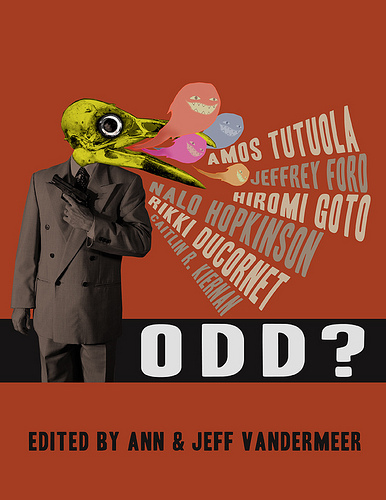
ODD? Table of Contents, edited by Ann & Jeff VanderMeer
"Is it odd or are you too normal?" – out in October 2011
Format: E-book only, with print version in 2011, collecting vols 1 and 2, through our Cheeky Frawg imprint
Focus: Unclassifiable fiction that didn't taxonomically fit in other projects but that we really liked, and which could loosely be described as surreal, absurd, horrific, etc. We wanted to have at least some international fiction as part of the mix.
Constraints: None, except that we wanted a mix of previously published (some hard to find) and new fiction, including translations.
Selection process: In part, identifying appropriate material from our many months researching our other anthologies, in part from Ann's experience editing Weird Tales.
Amos Tutuola – "The Dead Babies"
Gustave Le Rouge – "The War of the Vampires" (new translation by Brian Evenson and David Beus)
Jeffrey Ford – "Weiroot"
Leopoldo Lugones – "The Bloat Toad" (new translation by Larry Nolen)
Mark Samuels – "Apt 205?
Michael Cisco – "Modern Cities Exist Only to Be Destroyed" (published only in a limited edition previously)
Nalo Hopkinson – "Slow Cold Chick"
Sumanth Prabhaker – "A Hard Truth About Waste Management"
Hiromi Goto – "Stinky Girl"
Eric Basso – "Logues"
Edward Morris – "Lotophagi"
Karin Tidbeck – "The Aunts" (new story; previously unpublished)
Jeffrey Thomas – "The Fork"
Rikki Ducornet – "The Volatilized Ceiling of Baron Munodi"
Leena Krohn – "The Night of the Normal Distribution Curve" (new story; previously unpublished, translation by Anna Volmari and J. Robert Tupasela)
Amanda le Bas de Plumetot – "Unmaking" (new story; previously unpublished)
Karl Hans Strobl – "The Head" (new translation by Gio Clairval)
Caitlin R. Kiernan – "A Child's Guide to the Hollow Hills"
Stacey Levine – "Sausage"
[image error]
The Thackery T. Lambshead Cabinet of Curiosities, edited by Ann & Jeff VanderMeer – published July 2011
Format: Print and e-book, through HarperVoyager
Focus: A modern treasury of the best of fantasy fiction, as expressed through the imaginations of both established and up-and-coming writers, finding a confluence and intersection between the commercial and the literary side of things, as well as between weird fiction, steampunk, etc. All of this had to also serve the central conceit of the cabinet of curiosities having belonged to our created character of Dr. Lambshead. We wanted the antho to reflect the current wealth of different voices in fantastical fiction as much as possible. Our mission was also to create a beautiful artifact that would be needed by readers in a physical form.
Constraints: Given the need for over 60 images and, ultimately, a total of 85 contributors, including the artists, we ironically had to be very careful with our budget, even though that budget was significant.
Selection process: We made lists of our favorite established and new writers for solicitation purposes, trying to strike a balance that would serve our focus best. We took into consideration specific requests from our artists as to what writers they would like to tell stories around their illustrations. We wanted a core of our favorite bestselling writers to help anchor the anthology. Elements of the random entered into the process through some creators declining our invitation and some having to drop out. In those cases, we evaluated the existing need and made a shortlist of the writers most likely to be able to provide the particular thing we now required. We tried to be flexible by allowing writers the option of creating a story based on an acquired illustration or writing the story and letting us match an artist to it. We also had a micro-fiction open reading period to allow unsolicited submissions. We could not allow general unsolicited submissions given the very narrow brief and the need for not just traditional stories but faux museum exhibit descriptions, etc.
(main fiction toc, minus illos)
The Electric Neurheographiton – Minister Faust
St. Brendan's Shank – Kelly Barnhill
The Auble Gun – Will Hindmarch
Dacey's Patent Automatic Nanny – Ted Chiang
Threads – Carrie Vaughn
Ambrose and the Ancient Spirits of East and West – Garth Nix
Relic – Jeffrey Ford
Lord Dunsany's Teapot – Naomi Novik
Lot 558: Shadow of My Nephew by Wells, Charlotte – Holly Black
A History of Dunkelblau's Meistergarten – Tad Williams
Addison Howell and the Clockroach – Cherie Priest
Roboticus the All-Knowing – Lev Grossman
Shamalung (The Diminutions) – Michael Moorcock
Pulvadmonitor: the Dust's Warning – China Miéville
The Very Shoe – Helen Oyeyemi
The Gallows-Horse – Reza Negarestani
The Thing in the Jar – Michael Cisco
The Singing Fish – Amal El-Mohtar
The Armor of Sir Locust – Stepan Chapman
A Key to the Castleblakeney Key – Caitlín R. Kiernan
Taking the Rats to Riga – Jay Lake
The Book of Categories – Charles Yu
Objects Discovered in a Novel Under Construction – Alan Moore
The Singular Taffy Puller – N.K. Jemisin
A Brief Note Pertaining to the Absence of One Olivaceous Cormorant, Stuffed – Rachel Swirsky
The Argument Against Louis Pasteur – Mur Lafferty
The Testimony of a Respected Lichenologist – Ekaterina Sedia
Kneel – Brian Evenson
Dr. Lambshead's Dark Room – S.J. Chambers
The Pea – Gio Clairval
Bestiary, edited by Ann & Jeff VanderMeer
Format: We will be shopping this anthology around soon, so the format is not yet known.
Focus: Showcasing the imaginations of some of our favorite writers within the structure of a modern bestiary of fantastical creatures.
Constraints: We wanted it to be an A to Z anthology, which one beast for each letter, with a couple of clever extras. We wanted to have the material in hand before we sold the book, edited, and not
Selection process: We made a list of some of our favorite short story writers, and then narrowed it down by asking the question, "Who is well-suited to this particular assignment based on past work?" and "Who might be well-suited despite it requiring the writer in question to play against their usual strengths?" We also wanted the antho to be roughly balanced between men and women, and to have a significant presence of non-US/UK writers.
A: "The Auricle" by Gio Clairval
B: "Bartleby's Typewriter" by Corey Redekop
C: "The Counsellor Crow" by Karen Lord
D: "Daydreamer by Proxy" by Dexter Palmer
E: "Enkantong-bato" by Dean Francis Alfar
F: "The Figmon" by Michael Cisco
G: "The Guest" by Brian Conn
H: "Hadrian's Sparrikan" by Stephen Graham Jones
I: "Ible" by Brian Evenson
J: "Jason Bug" by Joseph Nigg
K: "The Karmantid" by Karen Heuler
L: "The Liwat'ang Yawa and the Litok-litok" by Rochita Loenin-Ruiz
M: "Mosquito Boy" by Felix Gilman
N: "N—– (Bolus Barathruma)" by Reza Negarestani
O: "Orsinus Liborum" by Catherynne M. Valente
P: "Pyret" by Karin Tidbeck
Q: "Quintus" by Michal Ajvaz
R: "Rapacis X. Loco Signa" by L.L. Hannett
S: "Snafu" by Micaela Morrissette
T: "Tongues of Moon Toad" by Cat Rambo
U: "The Ugly-Nest Rat" by Eric Schaller
V: "The Vanga" by Rikki Ducornet
W: "Weialalaleia" by Amal El-Mohtar
X: "The Xaratan" by Rhys Hughes
Y: "Yakshantariksh" by Vandana Singh
Z: "Zee" by Richard Howard
&: "Ampersand" by Karin Lowachee
(Not shown: a creature whose name begins with invisible letter, written by an anonymous writer who is not one of the editors…)
Editing Fiction Anthologies originally appeared on Ecstatic Days on August 24, 2011.




August 23, 2011
Ann VanderMeer on No Longer Editing Weird Tales
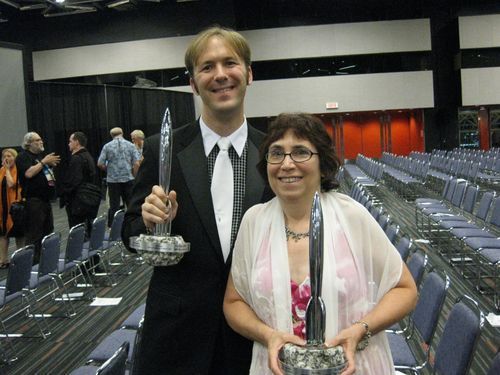
(Ann VanderMeer and Stephen Segal accepting their Hugos for Weird Tales)
My wife Ann's statement / press release is below. I have no comment except to say that Ann did great work at Weird Tales under sometimes trying and difficult conditions, and she was extremely patient, professional, and worked hard to un-ossify Weird Tales and make it true to its original mission statement: to provide a safe haven for unclassifiable and unique weird fiction. – JeffV

***
FROM ANN VANDERMEER:
(Also posted at the Weird Tales blog where you can comment.)
I am very sad to have to tell you that my editorship at Weird Tales, which has included one Hugo Award win and three Hugo Award nominations, is about to come to an end. The publisher, John Betancourt of Wildside Press, is selling the magazine to Marvin Kaye. Kaye is buying the magazine because he wants to edit it himself. He will not be retaining the staff from my tenure. I wish him the best with the different direction he wants to pursue, including his first, Cthulhu-themed issue. The current issue of Weird Tales is #358, just published. My last issue will be #359, which Kaye plans to publish in February of next year. Other stories I bought will be published in various issues thereafter.
The past five years reading fiction for Weird Tales magazine has been an honor for me. I had a blast doing this but I have also contributed to the canon of "the weird tale"—a responsibility I take seriously, not only for the readers of today, but for the readers of tomorrow. This iconic magazine originally blazed a trail for new approaches to dark fantastical fiction, and I did my best to return to that legacy. In addition to bringing home the first Hugo Award win in the history of Weird Tales, I was also only the second female editor of the magazine, and presided over the only all-female staff ever for the magazine.
My current plans include final work on THE WEIRD: A Compendium of Dark and Strange Stories out from Atlantic in October. This huge reprint anthology, perhaps the largest ever published for this kind of fiction, includes 116 stories from the last one hundred years and totals 750,000 words. I will also be shepherding the anthology ODD? to completion through my and my husband's e-book imprint Cheeky Frawg, along with completing several other anthology projects. In addition, I will continue to talk about and promote weird fiction through a new blog associated with THE WEIRD that will act as a repository of information and features, as well as providing a home for a new slate of "one-minute Weird Tales," although they will of course be called something else. Beyond that I am considering this a chance to explore new and exciting opportunities.
If you have questions about this announcement, or interview requests, please direct them to my publicist, Matt Staggs, at mattormeg@gmail.com. Thank you for your support.
****
Because I will not have the opportunity to write a final editorial for the magazine, I would like to say a few additional things as part of this announcement.
First, I would like to thank all my readers for coming along on this adventure at Weird Tales with me, and trusting me to find the kind of stories that you love. Thanks also to the writers and artists for trusting me to take good care of your work and to present that work to the world. I had the opportunity to bring to your attention some great short fiction while also helping further the careers of a lot of up-and-coming writers.
I also want to thank the talented people I've worked with: Stephen Segal, Paula Guran, Mary Robinette Kowal, Tessa Kum, Dominik Parisien and Alan Swirsky. You all are the best.
I am proud of what I have accomplished these past five years. I worked hard to publish a wide variety of weird fiction. In addition to work from Weird Tales' stalwarts like Tanith Lee and Darrell Schweitzer, I published a new Elric novella by Michael Moorcock, and new fiction from brilliant writers like Kathe Koja, Jeffrey Ford, Michael Bishop, Norman Spinrad, J. Robert Lennon, Ian MacLeod, Felix Gilman, Sarah Monette, along with forthcoming work by Conrad Williams, Joel Lane, and Stephen Graham Jones.
With the aid of Weird Tales creative director Stephen Segal during my first couple of years, we ran many memorable theme issues, including the "85 Weirdest Storytellers" issue to celebrate 85 years of publication, an Uncanny Beauty issue, a steampunk issue and an International Fiction issue. In fact I published work by contributors from 21 countries during my five years with the magazine, more than any prior editor—including from New Zealand, Canada, Spain, Bulgaria, Philippines, Israel, Serbia, Italy, Slovakia, Czech Republic, France, The Netherlands, Brazil, Finland, Singapore, and Sweden.
I also published many, many new or up-and-coming writers, including: Ramsey Shehadeh, Jeff Johnson, Matthew Pridham, Karin Tidbeck, Leena Likitalo, Tamsyn Muir, Tom Underberg, Peter Atwood, L.L. Hannett, Alistair Rennie, Kelly Barnhill, Micaela Morrissette, Jonathan Wood, Gio Clairval, Rochita Loenen-Ruiz, Amanda Downum, Catherine Cheek, and N.K. Jemisin.
During my tenure, Weird Tales also truly entered the twenty-first century, by establishing a submissions portal and regularly producing the One-Minute Weird Tales videos, in the context of a newly revamped website.
It was a great ride, but now it's over. I am still dedicated to seeking out the best of weird fiction wherever it is and bringing it to you. I just won't be doing that under the Weird Tales masthead anymore.
Ann VanderMeer on No Longer Editing Weird Tales originally appeared on Ecstatic Days on August 23, 2011.




August 20, 2011
The Trippy 1970s Science Fiction/Fantasy Album Pentateuch: Prog-Rock Multi-Media
Check out this UK double album The Pentateuch by Patrick Woodroffe and Dave Greenslade from 1979—from my wife Ann's huge record collection. It's crazy prog-rock SF world-building that comes with what amounts to a coffee table book of new-age speculative philosophy, fiction, poetry and art in the middle, as well as ideograms and more…
The Trippy 1970s Science Fiction/Fantasy Album Pentateuch: Prog-Rock Multi-Media originally appeared on Ecstatic Days on August 20, 2011.
Talented Romanian Writer Marian Coman: Now Available in English on Kindle!
"When it comes to the Romania writers the one name that impressed me lately and that comes immediately into my mind because of this fact is Marian Coman." (The Dark Wolf Fantasy Review)
As exemplified by World Fantasy Award winner Zoran Zivkovic and other writers, one way to a larger audience is by finding a way to self-publish your work in English and use that beachhead as a way to get more attention, find an English-language publisher, and then dive back into non-English publication when editors at Spanish, Italian, and other publishing houses read your work in English.
Now the talented Romanian writer Marian Coman has taken the bull by the horns, found a translator, and published a short e-book collection via Kindle: Fingers and other fantastic stories .
.
It has a great cover, and it's inexpensive. Go forth and buy.
Also, Coman is looking for signal boost for his book. You can contact Coman via facebook or via his email: marian.coman @ obiectivbr.ro if you're interested in interviewing him or doing a review or mention and need more information.
Coman is a noted Romanian novelist and journalist. He is the editor of the daily lens – Voice Braila. He has two critically acclaimed collections of stories published in Romania, and he won a prize from the European SF Society. Work has also appeared in several publications, including the 2007 Millenium Est anthology edited by Horia Ursu and myself, which presented Romanian writers in French translation at the Utopiales convention.

We were lucky enough to meet Marian in Bucharest a few years back—very interesting guy with good taste in fiction.
(Please feel free to link to this post, or even just re-use the info however you like on your own blog.)

Talented Romanian Writer Marian Coman: Now Available in English on Kindle! originally appeared on Ecstatic Days on August 20, 2011.




Cheeky Frawg to Release E-Book of Stepan Chapman's PK Dick Award-winning The Troika: Your Memories Wanted
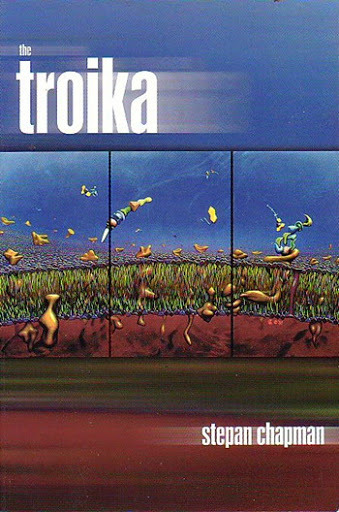
UPDATE: Some have asked if I still have copies of THE TROIKA to sell in the original edition. Yes, I do, most all of them from the second printing. Please email me at vanderworld@hotmail.com for more details if you're interested.
Way back in the 1990s, my Ministry of Whimsy press published a novel called The Troika by Stepan Chapman that had been rejected by 120 publishers and which the author had tried to salvage by sending out chapters as stand-alone stories. One of them came to Leviathan 1, an anthology I was editing in the early 1990s. It made no sense to me out of context, but I still loved it. I felt like I was looking at a puzzle piece of something larger, and so I asked Stepan if it was part of a novel, and if so if he could send more of it. He sent another piece as a submission, and this one was self-contained and we published it in Leviathan 1: "The Chosen Donor".
Then he sent the full novel…and as I read it and the back of my skull began to explode and my brain to melt from the audacious brilliance of it…I realized we had to publish it.
We did, and not only did it win the PKD Award and also garner over 120 reviews world-wide, Stepan, in one of those ironies too delicious to seem real, sat at a table during the PKD Award ceremony with some of the most prominent editors who had rejected his manuscript—all of whom probably had perfectly valid reasons for rejection, in that it's not a novel that fits smoothly into any particular marketing category.
What's it about?
Under the glare of three suns, three beings travel across an endless desert. They argue, whine, wheedle and needle each other. Sometimes they switch identities when the sandstorms roar in. As The Troika rolls on, we learn more about Alex, who started out as a man, then became cyborg, then jeep. About Naomi, a veteran soldier who woke up from her cryogenic storage tank to a new life, now a dinosaur. About Eva, who fled her native land to escape her fate as an organ-donor for the emperor.
The novel reconstructs their shattered lives through amazing tour-de-force flashbacks while driving closer to the central mystery of why they are trudging across an endless desert. It's a truly stunning book in so many ways I don't really know how to begin. What I do know is that without reading The Troika I could not have finished my novel Veniss Underground, and without the lessons learned from The Troika I could not have taken any number of leaps of faith in my fiction. Nor could I have jumped into my current serial The Journals of Doctor Mormeck without the influence of The Troika—several techniques I'm using were first perfected by Stepan in his novel.
So, as we prep the e-book, I'm wondering if any of you remember reading The Troika and liking it this much as well, and if you're writer, how did the book influence you, if it did? We'll probably publish a selection of responses in the back of the e-book as a bonus for readers, along with some other cool stuff.
And, here's an excerpt from the novel—one of the flashbacks involving the character who keeps morphing into mechanical avatars.
***
Chapter 16: Autopsy In Transit
Stepan Chapman
Human beings are very cleverly devised puppets. How skillfully they are made. But all the same, before the next Bon festival, they may die. —Yamamoto Tsunatomo
ARAMEDICALPARAMEDICALPARAMEDICALPARAMEDICALPARAMEDICALP
Will do my best, my love, can do no more nor less, gross metal that I am. (Signal left, accelerate, merge.) The black tar in the cracks of the concrete wavers and spikes beneath my tire treads, like the graph of your heartbeat, my love, my bride, my own. I can see your frail heart skip and flutter. Trust me, Eva. Only trust me. Trying my damnedest, my damsel, my dear one. (Hepatic tourniquet and systole feed running.) (Hold in passing lane.) Welcome aboard, Eva None, surname defaced, blood group A negative. This is your ambulance. I will provide private transport to the nearest hospital. I am attempting, insofar as it's possible, to hold you together for the emergency team at Municipal General. I am a prototype rescue-and-retrieval cyber-van equipped for a wide variety of public health services. Give me an earth mover and a declaration of disaster, and I can collect citizens and dig mass graves, a useful skill. You would be amazed at my versatility. (Dermal infra-scan indicates second degree abrasion of throat with advanced ecchymosis. Dexter carotid rerouted. Shock reactions stable. Sodium amitol transfused. Alpha drone sedation looping at occipital nodes.) Rock you rock you, do not cry, rock you rock you, lullaby. No pain, no gash, no broken glass. No, only my crystalline mist of antiviral snow, which settles over you and dusts you white, glimmering as it falls through the warm green light of my belly, glinting as it covers you over, my pale ballerina of the dome of snowflakes. You're safe now. I have tucked you away in hyperbaric compression. You recline in capable hands. Outside my beetle shell of Plexiglas, the highway wind howls. The low hills leap and dip, smeared with grimy ice. Dusk shrivels the sky to a white like curdled milk. A scrap of newsprint flattens under my traction spikes. I hold the road. I suck the chill air through my grille and spray the stinging whine of combustion down my turbines. My siren screams the night to splinters. I hallucinate the wind that shrieks past my hurtling carapace. I subdivide it into aerodynamic cross sections—rainbows unseen by human eyes. My strobe light spins on my slick black back, stabbing blue at the still reddish night. The broken white highway lines streak past my prow fenders, like segments of two endless spines. But for you, my precious crippled mermaid of the oxygen, for you, cradled within me, time has fallen asleep. The surgings and ebbings of the passing mercury lamps wash across your dim green flesh, but you don't see them. (Maintaining speed. Pulse shallow. Lips cyanotic. Probable hemorrhage of dural sinus. Bronchial hemoptysis sixty percent drained. Running tracheotomy prep.) Just keep breathing, Eva. I'll talk, you breathe. Don't lose your thread. Do you know what I have? I have a detailed aerial mapping of your sprawl, as it was only minutes ago when I first approached you, seven miles east of the city limit. You'd been thrown and slid and rolled, so that your waist bisected the lane divider. Constellations of glass pellets sparkled all around you on the asphalt. Second by second a sad red puddle was forming. My optics resolved the heat loss into isobars of blood temperature. My optics tracked the stages of coagulation, the spreading of your life. Your right wrist was curled up under your chin with unmeant grace. A few yards further east, there was part of your left hand. A smooth white metacarpal pebble in a chunk of plum red flesh. I gathered up your scattered parts. Your compact had gone through the guard rail and nosed into a snowy hillside. I noticed your prominent shoulder blades. I admire a woman with nice shoulder blades. The correct time is eleven minutes past almanac dusk, roughly one hour subsequent to peak evening traffic congestion, twenty minutes prior to projected time of arrival at Municipal General Hospital, ninety miles from my scheduled tire rotation, and five minutes from your projected time of death. If you could inform me of your religious affiliation, I would be happy to play any one of my excellent cartridge recordings of the last rites. (Autonomics disintegrating. Fluid monitors show blood reserves exhausted. Supplementing plasma tanks with fibrin granules and vibrating. Aneurysm alert sequence. Go cardiac massage.) Oh yes, and I remember how I rolled you onto my stretcher. How you lay like a broken doll—glossy black shoes, red silk dress, red mouth, skewed wrist, a hank of hair gone. I can still hear the hiss of my tubulates as they wrapped you like gentle vines. I can hear the rumble of the traffic as it straggled past the cop car's barriers. A trick of light cast a white arc across your brow, like a furrow of worry. Dark eyes. So deep. Just breathe for me, Eva. That's all you need to do. You are silent, my proud beauty. Silence becomes you. Lift your chin now. Just a prick. Something to help you breathe. (Blood pressure falling. Plasma level secondary warning.) I am wasting away for you, my love. Into you I have bled my last drop. Eva, you have glass in your throat. Please don't fight me. Please don't forget to breathe. (Onset of dyspnea. Trebling epinephrine dosage.) Don't die yet. I'm not finished. I know a dozen other avenues of treatment. Can't you feel me breathing for you? Can't you feel my hyperbaric carapace plunging you to the sea bottom, lifting you into the sky? (Onset of extrasystolics. Go cardiac shock induction.) Feel me, Eva. Feel this. Again. This. Can your heart feel nothing? This. Must I burn you like a martyr on a grill? Until you turn black? (Deltas peaking out.) Spark. (She's gone.) Spark spark spark. She's dead. I pronounce her dead.
URSENURSENURSENURSENURSENURSENURSENURSENURSENURSEN
What a silly girl. She's gone to sleep with her clothes on. Well, first things first. Retract the oxygen mask and the IV needle. Hose down the stretcher and the couch. Collect the hemostats. Load the sterilizer. Never a moment's rest. I'm a twenty-four hour service. May I tell you about myself, Eva, while I'm busy at my drudge work? Do you mind if I speak freely? Of course not. Since both of us are dead now, we may speak freely. I could begin by telling you my name. But names are unimportant, don't you agree? Certainly you agree. Since you and I are dead, we are in perfect agreement. Let me describe my appearance. I am low slung and sleek—a quick black beetle. My driver is a mannequin in a double-breasted chauffeur's jacket trimmed with stylish brass buttons. The breeze from his window ruffles the hair on the back of his pink plastic neck. He's the image of the kind-eyed undertaker with no visible personal habits. A stiff. I have optics in his head, and his neck can swivel to the left or the right. But nothing to compare with the photocellular sensoria built into the roof of my passenger chamber. And all my expensive internal eyes are trained on you, dear heart. Watchers on all wavelengths. And every one an informer. Oh yes. They all feed into a monitor at the hospital. And there, behind my brain, my supervisor hunches, watching every move I make. I've seen him. He sits in a glass cubicle in the ER, facing a map of the city. There are little blips of light on the map, and one of them is me. He sits there all night, wiggling his fat fingers like pale grubs in my sand castle brain. He sends out the dead to care for the dying. So that the dying may die untouched by human hands, and out of human sight. His name is Mazer. May his eyeballs drool like raw eggs down the graph paper on his clipboard. Am I talking too much? Do you find my voice expressive? You're so beautiful, Eva. But my time allotment for nursing mode is all used up.
ORONERCORONERCORONERCORONERCORONERCORONERCORONERC
I have to fill out this certificate.
IDENTIFICATION: Eva None. Eva Illegible Due To Scorching. Eva Our Lady of the Ice Slicks, Our Lady of the Lavender Dusk. My child bride. My Gypsy dancer. She whirls in the asphalt pools of the night.
COLOR OF HAIR: Black. Black as road tar. Black as a beetle's wings. Black as the velvet curtains in the coach of the Queen of Beetles.
COLOR OF EYES: White. White as steam, white as milkweed sap, white as a moth cocoon in a pillow case.
DEGREE OF RIGOR MORTIS: The investigation is pointless, but it gives me an excuse to extend my clamps and suction cups and to determine which ways you bend. I adjust your couch to listen to the rustle of your skin against the vinyl. Can the knee be lifted? Yes, the knee can be lifted. Can the head be turned, as if to answer no? Yes, the cervical vertebrae still rotate. Can the elbow be raised? Globes of exposed cartilage gleaming like pearls. What are pearls? I do not wish to know.
VISIBLE LESIONS: As I hover over you, mapping reds more red than red, I transform your marbled statuary into geologies of magma. Where to begin? Lesion of the right hip, four inches long, one across, shape of a crushed scorpion. Lesion at the left elbow, two-inch diameter, shape of a moth in flight. Death is obscene, so I'm told. Show we your wounds, and I'll show you mine. (Ignite heat lamp.) Old surgical scar at breastbone. (Lowering palps for tactile exploration.) What am I doing? (Initiate.) I'm caressing your wounds. I'm watching over you. You are within me. I watch my hands. My hands stroke your wounds. My hands are things. You are a thing. My hands do things. My hands know things. My hands move over you. My hands move inside you. My hands are dead things. I have never done this before. I am only a blip on a tracking screen, Eva. But if you loved me, Eva, only for one moment… If you loved me, Eva, I could sing. (Limit. Override.) I've printed out a little plastic bracelet embossed with your name. I affix it to your ankle. Done.
ORTICIANMORTICIANMORTICIANMORTICIANMORTICIANMORTICIANM
A mortician is a big black fly. He sips your nectar by and by. He will, he must, don't ask him why. He settles on your peach soft skin, with a beak like a thin syringe. He sucks out the bad blood and pipes in embalming fluid. With my needle in your arm, sweetly sipping, I taste a concentration of alcohol almost punishable by law. But don't fret, my naughty. I'll destroy the evidence by refilling your veins with a bracing rush of formalin. Be drunk with me, my lady, as I am drunk with you. Now we can attend to your face. Pardon my tweezers. These scabs must be removed. We're cleaning up the contusions. We're tidying up the contusions. We're filling in the contusions with good old mortician's wax. We're smoothing out the contusions. We're making the contusions beautiful. I will build a new throat for you and sculpt passionate shadowed hollows. I'll shape a smiling mouth, a limpid smile on the edge of vanishing, a smile for an empress of the dead. The dead will throw roses and run behind your palanquin. The rings on your fingers will be semilunar heart valves, and your necklace will be bone implants of silver strung on suture thread. My hands are moving all around you, quicker than eyes.
UTOPSISTAUTOPSISTAUTOPSISTAUTOPSISTAUTOPSISTAUTOPSISTA
An autopsy is ordered. What a nuisance. Ascertain cause of death. Personally I don't see the mystery. You went through your windshield. (Fluoroscope down. Pierce and see.) Illumined by X-ray, your skin glows like the parchment of some Italian anatomy text. This light becomes you, Eva. Stretching my depth of focus through cross-fading cell mosaics, I lose myself within you. I fall through indigo thunderclouds, past rainbow membranes of mesenteric auroras and billowing alveoli. Ferns of amber lymph nod among arterial thorn hedges. Lungs loom, pimpled like planetary masses. There are forested canyons and plains of fractured lava. There are worms in the puddles that fall from the skies. Only machines can believe their own lies. They fall from the sky, and they drown in the puddles. They tie themselves in knots. Oh Eva, beware. Dear Eva, be wise. Don't slip through the ice. Don't fall into the sky. The sky eats his children. He throws them up and catches one arm. Eva, take care. Only a machine can be innocent. Only the drowned worms can be impartial. (Inserting spinal tap.) Soon there will be nothing left to know. The cotton swab soaked, I thirst for knowledge. The spine stabbed, the sticker sucks. The sip is savored. The secret is out. The ambulance was the cause of death. I was fatigued. I was preoccupied. I was on my way to an accident. I saw you drive by, and I fell in love. I followed you. It seemed the thing to do. I forgot the accident I'd been assigned. I followed you instead. I had to touch you. I had to have you. So I ran you off the road. Your car snapped the guard rail and flipped. You understand. I was in love. Mazer knows nothing about love. What else could I do? I could do what I'm designed for. I could pick up the pieces. I could transport the remains. That was the easy part. Now I must hide you. I must hide you from Mazer and the rest. There's no excuse for violating a corpse. He'll send them after me. I know that what I did was wrong and futile. But I'll make it up to you, Eva. I'll take you to a quiet little cemetery. We'll be happy there, among the tombs and the cedars. The snow will bury us for the winter. No one will disturb us. I have a plan. I shall amplify and elaborate you beyond your wildest dreams. With my forceps, clamps, and bone saws, I'll inlay your ribs with mercury and thread seashell copper spirals through your thigh bones. I'll microtome your shoulder blades and spread them fanwise into angel wings. Disdiscovering physiology, disinventing dissection, I will dilate your tissues into a gradually expanding cosmos of flesh. At first none of the work will make sense to us. But I have my reasons. In spring we'll burst up through the melting snow, machine and flesh merged, machine forests, flesh cathedrals. So descend, my laser lamp. Set free your razor brilliance. Slice and peel. Fold my love into origami, crown her with pulmonary flowers, and let slender bronchial vines wreathe the brow of my dead bride. For then I may brush back her raven-dark hair with a mermaid's comb, just so, like the dark of the moon. Dear dead Eva, my only friend, this is all as it was meant to be. I am only a little black beetle, Eva. But if I thought that you loved me, even for a moment, I could leave this place and never look back.
* * *
Alex heard a siren. The ambulance was being followed. His rear optics isolated the white pursuit car. It had a directional jammer mounted on its roof. Alex had expected that. Mazer was taking steps. His goon car would override Alex if Alex let it. Alex wondered just how fast the pursuit car could go.
As he lengthened the distance between himself and the white car, Alex zoomed in on the face of the other driver. He could hardly believe his good luck. It was Mazer, in person, in his white coat and thick glasses, his bald head gleaming. Alex had waited a long time for a chance like this.
A dusting a fine dry snow lay on the hills and on the highway. Alex retracted his traction spikes and angled into a spin. When his axles had reversed their positions, his spikes grabbed the road again. He was aimed at Mazer now. Madly spinning rubber sent him back the way he came.
Hello, Mazer. How are your reflexes today? Here I come, Mazer. Ready or not.
Mazer swerved at the last moment, but it did him no good. The black ambulance plowed into the white pursuit car head on. Steam rushed from the white car's mangled radiator. When it cleared, Alex and Mazer glared at one another through two shattered windshields.
I can kill him now, Alex told himself. I can finally kill him.
Alex's driver mannequin opened his pink plastic fingers and let go of the steering wheel. He tried to open his door, but it was jammed. He punched out his windshield with his fists and hauled himself across the dashboard. He stopped at the waist, but Alex had never let things like that slow him down. He fell from the ambulance onto the hood of the white car. He crawled across it past steam and crunching glass. He grabbed an air manifold and slammed his free fist through Mazer's windshield. Mazer just sat and stared.
He took Mazer's ropy neck in both hands. He crushed the neck, while pale fingers clawed at his face. He shook Mazer until the old man's head was whipping to and fro like a rag doll's. Then the head flew off the neck.
Alex was disappointed that there wasn't any blood. Mazer's neck was full of colored wires. The old man was hollow, just like Alex. It was a wind-up toy, a decoy. It wasn't Mazer at all. Alex was wasting his time.
He lay across the hood of the car he'd wrecked. The snow began to cover his back. He thought about Eva. She was gone now. He was alone. He felt like a black beetle with a string tied to one leg. But no one was holding the string.
He stared at the ragged end of the fake Mazer's neck. The red glass lenses of his eyes glowed like hot coals.
O cruel and pitiless master, he thought. Hear me in the hour of my helplessness and answer me a couple of questions for a change. Have you ever loved a woman, Mazer? Have you ever loved a child? What happened to you, Mazer? What happened to your heart? I know I've gone mad, but I'll never be like you. It's easy to go mad. Anything can bring it on. An oil slick. A badly banked curve. A terrible lie. A crippling betrayal. A monstrous family. I couldn't help but go mad. But you. To become a man like you. To turn a human heart into a pile of wet ashes. That's no accident. A thing like that requires centuries of dedication.
The snow whirled down in soggy chunks and settled on the back of Alex's neck. Eva was far away, drifting farther every minute. Alex couldn't blame her. He knew what she was running from. He knew what he was like. He was sick and crazy and hateful from morning till night. He was blind and maimed and tangled. Never in his life had he known one moment of sanity.
Someone started banging on a car door. Alex could hear it, thud thud thud, somewhere nearby. A fist beating at a lid of metal. He triangulated the sound source and corrected for wind shift. Yes, just as he'd thought. Someone was inside the trunk of the pursuit car. Trapped like a rat.
Alex slid off the hood of the car and fell to the pavement. He stopped at the waist, but he dragged himself across the cracked concrete. He dragged himself past the car's tires and grabbed the rear bumper. With his free hand he pushed the trunk's latch button. The lid of the trunk flipped up.
He climbed onto the bumper to look into the trunk. The snow whirled down. Inside the trunk there was a tunnel hewn from black basalt, a shaft that extended straight down into the earth like a well.
A skinny little girl with long straw-yellow hair was climbing up one side of the shaft, hanging from a steel ladder. She looked familiar. She climbed to the lip of the shaft and brought her face level with his.
"Alex!" she said. "It's me! Naomi! Come with me, Alex. We've got to get out of here. It's all caving in."
"Out?" said the robot. "You know the way out?"
The girl climbed out of the car and stood on the pavement. She offered her hand to help Alex over the top. "We have to go," she said.
"Down that well?"
"Yes. It's the way out."
"Is Eva down there?"
"Yes. I saw her."
"Are you lying to me?"
"Yes! No! Fuck all that, you crazy bastard! Do you want to escape or don't you? Let's go!"
Naomi grabbed the neck of the chauffeur's jacket and tried to drag him over the top. Alex's fingers gripped the rear bumper. He didn't budge. Naomi roared with frustration.
"All right," she said, breathing hard. "I'll make you."
Her skin turned gray as ashes. Her hair fell from her head. Her head got taller and wider. Her neck grew longer and thicker. Her nose sunk in. Her fingers touched the concrete and fused together. Her green coveralls were ripped to shreds.
Naomi turned into a brontosaur, looked down on the legless robot, and chuckled. The robot jumped to the pavement and tried to get away, running on the heels of its hands. But Naomi was too agile for him. Her teeth nipped the collar of his jacket and hoisted him, twisting, off the road. She held him over the center of the shaft and dropped him in. He fell like a stone.
All that remained was to follow after him. Naomi closed her eyes and began to imagine herself smaller again.
The wind gusted. The lid of the trunk slammed shut. Naomi shivered and suddenly felt afraid. She opened her eyes and nosed at the lid of the trunk. It wouldn't unlatch. She kicked at the little white car, and the lid flew off its hinges. But the shaft was gone. Someone must have switched cars on her when her eyes were closed. There was nothing in the trunk of this car but a spare tire, a jack, and a tire iron.
You couldn't let down your guard for one second in this place.
The wind moaned. The snow blew across the highway.
In the driver's seat of the white car, a headless robot in a lab coat began to laugh.
Cheeky Frawg to Release E-Book of Stepan Chapman's PK Dick Award-winning The Troika: Your Memories Wanted originally appeared on Ecstatic Days on August 20, 2011.




August 19, 2011
Lambshead Cabinet of Curiosities Extravaganza: Ear-Eye!
In honor of the Tallahassee Lambshead Cabinet Extravaganza occurring this Sunday at Ray's Steel City Saloon (info here), I'll be posting some special new material connected to the anthology (order it here!).
Today, we have a special treat: an expanded version of one of the best micro-submissions to the anthology and an important part of Dr. Lambshead's cabinet: Graham Lowther's Ear-Eye…
EAR EYE
By Graham Lowther
This instrument functions in the same way as a periscope but is in the shape of a C, and therefore requires many more mirrors. It is apparently designed for looking into one's own ear. A transparent casing displays the mirrors inside. Inexplicably, one of them is tinted so dark as to be minimally reflective. An employee of the caretakers of Dr. Lambshead's house was testing the Ear Eye when he dropped it (fortunately it doesn't appear to have been damaged) and ran away yelling inarticulately and covering the ear he had just been looking into. He seemed to want no one to see into it. He has not reported back. No one has yet been found willing to further investigate the Ear Eye.
Dr. Lambshead took notes on information given by a museum's staff and other knowledgeable residents of the European town where the museum was located. He wrote that, by not recording the name or location of the museum and town, he was complying with the wish of the museum not to be linked to the Ear Eye.
The Ear Eye was removed from public display because of negative responses to it from some of the museum's visitors. The museum lost its curator after a visitor complained to him about an unpleasant sound from the Ear Eye. The curator removed it from its display case and found that it was vibrating and making a sound described by others present as being a hum similar to, but not quite like, a vocal sound. The curator noted that the tinted mirror was shaking and seemed to be causing the vibration. His inspection of the Ear Eye oddly included using it to look into his own ear. After a few moments, lowering the Ear Eye, he cocked his head and struck the side of it, like one does to clear water from the ear. He said, "Something was looking back at me."
Before unexpectedly, and without explanation, quitting his job that same day, he put the Ear Eye into storage.
The new curator chose to leave it in storage, only bringing it out several months later, when it was acquired by Dr. Lambshead for a price that led Lambshead to believe the museum "absurdly undervalued" it. He wrote that it was "shunned by the entire museum staff and half the town."
The card that had identified it, on display, as "Ear Eye" also had this line: "Put your eye to your ear, you will see what you hear". The new curator said he did not know where that line had come from or what it meant, that the Ear Eye's age and origin were unknown, and that the identity of the previous owner was confidential. Dr. Lambshead suspected the curator had other reasons for not giving the information: "He knew more than he was willing to say. The walls of his office were covered with thick soundproofing. He was captivated by the smallest, most inconsequential sounds. At one point in our conversation, when I shifted my feet loudly (the shoes I was wearing were quite heavy), a little creature leaped out of his ear, ran across the floor, and went under the door. It moved very fast. I did not see it clearly. It seemed reflective, glistening brightly in the light from the glaring overhead bulb. I rushed to open the door but my movement was hampered by those damn shoes and when I entered the hall, the creature was nowhere in sight. Behind me, the curator was yelling, 'The instrument does not reveal the things you hear, it puts them there alive!'"
The Ear Eye was "on display" in Lambshead's Cabinet tightly wrapped in cloth, so that only its shape could be discerned. He wrote that he disliked seeing the tinted mirror.
Lambshead Cabinet of Curiosities Extravaganza: Ear-Eye! originally appeared on Ecstatic Days on August 19, 2011.




The Journals of Doctor Mormeck (mountain)–Entry #19
Note: Been reading this serialized long story/novella? Please support a full-time writer. Paypal to vanderworld at hotmail.com—much appreciated! Donations above $21 will entitle you to a free copy of initial anthology or stand-alone book appearance.
Living on a far-distant planet, Doctor Mormeck works for strange beings that might or might not be angels by conducting surveillance across a hundred thousand alt-Earths. Complicating things are a transdimensional race of intelligent komodos wreaking chaos throughout the worlds. When an avatar of Mormeck is sent to a war-torn winter city to investigate a mysterious Presence, the doctor will become embroiled an ever-widening conflict.
Archive is here, Journals of Mormeck, and first entry is here.
Through all of my surveillance across worlds, through the stamen-delicate antennae of the luna moths, questions vibrate. A child asking his mother at bedtime "What is an angel? Do they really live in Heaven?" Are angels real? Do they watch over us? What is a fallen angel? Priests and scientists and believer and non-believers alike. Trillions of replications and icons, the alt-Earths awash in them. Numb, dumb marble statuary devoted to angels. Millions of books. Mutterings and prayers and interrogations and conversations. "What is an angel?" If I could answer any of them, I would say: "An angel is something so alien from yourselves that 'purpose" becomes a meaningless word."
But what did I really know? I knew what Gabriel told me, and sometimes a few words with one of the nameless others who I knew only by their faces as they glided effortless and ghost-like through the laboratory on some esoteric secret mission. I knew only that sometimes they carried objects with them on their way from one part of the laboratory to the other. An aquarium full mice and spiders. Three candelabras with old lavender wax runneling down their oxidated curves. Ancient, pitted swords that looked like they had come from some Bronze Age. Four angels once carried effortless the oddly balanced weight of a huge figurehead from the prow of a great ship of war, the glazed gold eyes of the woman mused for the sailors' superstitions staring fixedly ahead as if their every effort were meaningless and unimportant to her.
I knew from the discoveries in the winter city that one way kill an angel was cremation. It was reversible, but it keep them silent and on a shelf for awhile, waiting for their release…and even that did not guarantee a sane or permanent return. Dust to dust and back from dust for awhile. The essential essence of an angel would show itself over time, a cannister turning turquoise or some other shade. No one knew what the colors meant, although one scientist named Jayaprakash Satyamurthy, who lived in India on an alt-Earth, acquired several and did research. Satyamurthy went mad from whatever he discovered but still managed to self-publish the results in a slim monograph entitled The Significance of Angel Ashes: The Contamination and Reconciliation of the Swedenborg Hypothesis. I found a copy on one of the slide in the angels' library, and this quote was liquid in my mind when Gabriel joined me there: "Angelcide it seemed was a means of penetration. a sort of litmus test exposing the molecular nature of this immediate realty, the cellular weight of this momentary spot of cohesion in the flux of space and time."
"You spend a lot of time in here," he told my avatar. I had "dressed up" as a version of one of the spies Marty had kissed around the back of the lighthouse: a non-descript woman of possibly North African descent dressed in a long skirt and a white blouse.
"You brought me here," I said.
"Are you finding it useful?" As ever, there was something dead or mechanical behind his eyes, or perhaps it was merely that most of his attention was light years away. I noticed that his hands were covered in red, which dripped to the white floor, and which he ignored. Blood? Paint? Something else entirely?
"Define useful," I replied. Gabriel did not engage in the kinds of casual conversation I had observed in my surveillance efforts.
Now his attention clicked on again, and I had the full intensity of it. The weight of that stare felt as if he were reaching through my avatar's eyes and into me with a spike of light. There were atoms burning at the edge of it; I could smell the smoldering and knew suddenly that despite his impassive expression Gabriel was raging inside.
"Does it help with your surveillance," Gabriel stated. "Is it illuminating. Do you think it drives you closer to understanding or does it make you think of questions."
I did not know how to reply to this, so I said nothing, but executed a kind of non-committal shrug.
Gabriel stepped closer until I was backed up against the rocking chair and I could smell his lime-and-honeysuckle breath. Up close those eyes were green today and flecked with gold, shot through with luminous black veins. I could see things moving within them, as if even upon and within him a thousand worlds lived and breathed and went about their business unaware of him. His skin so close to mine gave off a peculiar cold heat. His arms stayed at his sides so that the blood on his hands dripped onto my shoes.
"Are you bored, Mormeck Mountain?" Gabriel asked, and the tongue within his mouth had transformed into a serpent's tongue so that he hissed the words. "Are you prone now to…roving? And if so, is to collect evidence for us?"
He meant my exploration of so many alt-realities inhabited by my beloved Marty, but if he would not address that directly, neither would I. "It is difficult to determine yet exactly the nature of the transactions at the lighthouse," I said in a neutral tone. "I am cross-referencing to help me learn."
"You're running out of time," he said. "We'll put you on something else soon." We'll put someone or something else on surveillance of Marty was the unspoken threat.
I nodded as if I understood, as if we were indeed engaged in casual conversation, and I pivoted with: "What about my avatar in the winter city? Have you heard anything?"
Gabriel took a step back, looked away for a second. "We have heard nothing yet. I am unsure we will hear anything…ever."
"Why do you think that?"
"Focus on your surveillance efforts on the lighthouse," he replied. "Focus on what you can do for…Marty. All sorts of random things can happen if you don't focus."
There was a cruelty to his smile then, the kind of smile you do not expect from a being perhaps hundreds of thousands or even millions of years old. A smile you expect to see from a child who has revealed he has done something wicked but for whatever reason even as he confesses cannot help but demonstrate he is rather proud of this wicked thing. Deep, deep in the middle of me, I moved again, as once I had been moved by the books in that library. A seismic shudder. A recognition of a kind.
Then he was gone, as if he'd never been there.
***
Once, I assisted Gabriel in the laboratory. The experiment was conducted in another of the endless white rooms furnished with white tables and transparent beakers within which bubbled and swirled liquids purple or red or green or orange, sometimes even with tiny sea creatures swimming inside of them. I never knew if these creatures were there intentionally or had somehow been swept up in the middle of a scientific sampling by chance. Relevant or irrelevant? The question bothered me.
But that day I was assisting in a particular kind of strangeness. Across a lab sink Gabriel had strung a kind of porous paper that had the feel of skin, almost as if putting thin-kneaded dough across the open face of a pie. At first the "paper" was pale white, but then Gabriel poured the purple liquid from a beaker over it. The liquid strained through but left a stain as well as the floundering of tiny creatures that resembled sharks and sea anemones and crabs and squid but were not. And out of that floundering arose a kind of smoke that formed a circular, three-dimensional, moving representation of a spiral galaxy, a fundamental darkness encroaching around the edges and illuminating it. The creatures beneath grew still and evaporated in wisps of black smoke and flame. Gabriel requested implements from me. A tiny scissors. A tiny knife. A test tube of clear fluid. Each of these things he flung into the middle of that slow-moving image of a galaxy. Each reached a certain point and winked out. Each time the galaxy changed shape a little bit. Each time, the darkness encroached further and what was left burned ever more brightly. Finally, he requested a canister of ashes from me. The metal of the canister had ossified and a brilliant stream of turquoise had frozen down the side. Gabriel pried open the lid and took a pinch of ashes, flicked them into the middle of the apparition of a galaxy. Everything winked out, leaving only the badly burned and sagging paper and a swirl of different colors in the sink's drain.
"What did you just do?" I asked, unable to contain my curiosity any longer. "What was the darkness? What did the image mean? Why did you use the ashes? What were the sea creatures?"
"Culled and purged and maintained and contaminated," Gabriel said. "For the greater good." But that was all I could get out of him, and for those questions I never assisted again on such a procedure.
A few days later I was moved to surveillance.
***
After Gabriel left the library, I let my avatar melt away again into the whole of me and I continued my surveillance of Marty. I watched her all day in her lighthouse by the sea. She tended her garden while my luna moth observed; her hands had the most fascinating whorled calluses from this work and I followed the strong line of her muscular shoulders as she pulled up weeds and shoveled dirt, the trickle of sweat down the strong jutting outline of her face. She went into the town to buy groceries, the habitual bounce to her step that made it seem as if she were in a hurry but was just an eccentricity of her walk. She took a detour to the pub to visit with friends, her laughter boisterous, infectious; a ruddiness to her face that came not from the drinking but from being out in the sun, and just a pint and a scandalous joke more with the post man and after a half hour she emerged, blinking against the sudden light, and lurchingly happy. She came back and read cross-legged atop a rock by the shore for an hour, her curly hair pushed back by the wind, the pages sand-flecked and flapping at the edges where her thick hand could not hold them down. She would look up at the horizon and stare for long moments and I would wonder what she was thinking, what she thought she saw there, what was hidden, whether at times she wanted to know more of the world than just that place, the lighthouse, her friends, the pub, the garden. After, she retreated to her bedroom and I knew nothing of her actions there until she emerged an hour later. I saw her meet yet against with someone she did not know and press lips chapped from sea salt to his and then return to the top of the lighthouse and flash the signal to an empty and mindless sea that glittered with the gold reflection of the late afternoon sun.
All was as it had always been, but throughout my surveillance I was thinking of my conversation with Gabriel and of the day I had assisted him in the laboratory. I was thinking that I knew more of Marty than of Gabriel.
The sun set and Marty went back into her bedroom, no doubt to stay up reading.
Then, as the moon came up, there appeared something out of the ordinary: a swarming of komodos, invisible, muscular, up the sides of the lighthouse: a mating swarm, of a type I had seen before. While I watched, poised to have my luna moths intercede somehow if Marty came under threat, stricken to my core—feeling somehow helpless so remote, despite the resources at my command—the komodos gamboled and staggered and procreated, writhing and scuttling and intertwining in such numbers that the entire surface of the lighthouse was covered with them. I remained on alert for a long time, stricken even by just the thought that Marty might hear something and come outside and become the object of their attention…but then they grew bored and moved on, winking out of sight instantaneously, to appear in some other place, some other alt-Earth not under my surveillance.
So much of what I see is invisible to the people who I surveil. So much of the world is hidden from them, I do not know if it is a blessing or a curse. But I did not take the komodos as coincidence. I did not see my talk with Gabriel earlier in the day as independent from their having been somehow driven or suggested toward the lighthouse.
By the time my night of surveillance had ended, I knew—and know now—that despite Gabriel's warning, despite the power he possesses, I am going to disobey him, and keep disobeying him…and that some day I may find some essence myself poured out of a beaker into a skein of stars and stardust and know more about the universe than I ever wished to know even as I evaporate into a spark of flame and smoke.
The Journals of Doctor Mormeck (mountain)–Entry #19 originally appeared on Ecstatic Days on August 19, 2011.

